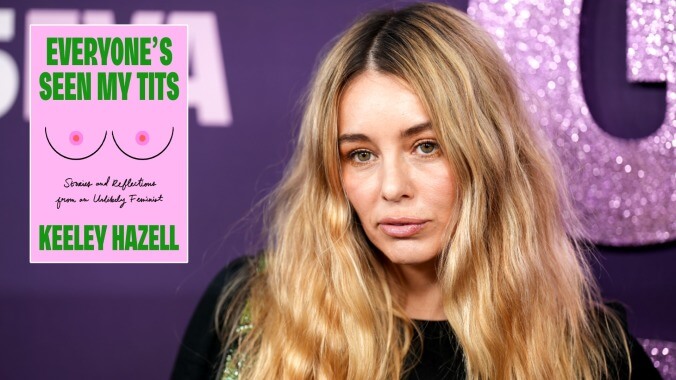‘Everyone’s Seen My Tits’ Is a Cheeky Title for a Memoir About Gender and Sexual Trauma
"I wanted to explore class and feminism, and my story really lends itself to that," Keeley Hazell told Jezebel about the process of writing her new memoir.
Photo: Getty Images/Grand Central Publishing BooksCelebritiesEntertainment
If you’re familiar with British lad mag culture, exemplified by FHM, Maxim, and Zoo, you might recognize Keeley Hazell, who proclaims in the title of her memoir, out this week, that everyone’s seen her tits. She shot to British notoriety during the mid-2000s as a Page 3 girl, so named for the third leaf of tabloids such as The Daily Mirror and The Sun, which offered readers a side of topless glamour models with their morning coffee. “It was bizarre, the thought of people around the country doing their morning routines, drinking tea, eating slices of toast,” Hazell writes. Revered in certain sub-cultures with the esteem of posing for a Playboy centerfold, being on Page 3 offered young lasses their shot at 15 minutes of fame. For Hazell, it was her shot at freedom.
Growing up working class in Lewisham, London, Hazell paints a picture of intergenerational poverty, addiction, and domestic abuse. Everyone’s Seen My Tits is subtitled Stories & Reflections from an Unlikely Feminist, and Hazell had feminist observations from a young age—even if she wasn’t able to place the gender equality label on them until her 20s. “When I was 8, I was having an argument with my cousins about men’s and women’s places and I was like, women have to do everything: the cooking, the cleaning, and they have jobs! The guys do nothing!” she told Jezebel via Zoom from her Los Angeles home late last month.
Still, she felt ostracized from a movement that saw her and her topless modeling as incompatible with feminism. One pivotal moment in the book hinges on an interview she did with a journalist who asked her how it felt to be contributing to rape culture by getting her kit off (to use a Britishism). Though Hazell writes that these types of assertions have since been debunked, the arguments of critics who feel Page 3 sexualized women. (The Sun ceased publishing Page 3 in 2015 and most other publications followed thereafter). “Page 3 can definitely elicit the objectification of women, but I think women are objectified anyhow without it,” she said.
If you’re not familiar with Page 3 until this reading, you might better recognize Hazell from her role as Bex in the mega-hit Ted Lasso, for which she wrote the season three episode “We’ll Never Have Paris,” which is based on her experience with image-based sexual assault. If you’re confused, yes, Keeley is also the name of a character on Ted Lasso, played by Juno Temple. That character, written by star and co-creator of the show, Jason Sudeikis, was based on Hazell’s experience; Hazell gave script input early on, and was originally set to play the character based on her.
“A fucking joke. I’m good enough to be a character, but I’m not good enough to play her,” she writes in Everyone’s Seen My Tits upon discovering that Temple—who had a “bigger résumé”—got the role instead. “Of course she had a bigger résumé. While I was digging through phone booths for coins so I could eat, her dad was casting her in his films!” (She appeared in the 2000 movie Pandaemonium, which was directed by her dad, Julien Temple.)
Hazell only appeared on the show after accepting a smaller part, as the wife of a fictionalized version of David Sullivan, the majority owner of West Ham United. Sullivan is also the former owner of The Sunday Sport, which published a stolen sex tape of Hazell in the late 2000s and is the last Page 3 holdout. “Had I been in a more stable financial situation” when she took the role, Hazell said, “I probably wouldn’t be in the show at all.” She is not currently working on the fourth season of Ted Lasso.
Everyone’s Seen My Tits is in conversation with other recent memoirs from women who’ve experienced sexual trauma while being in the public eye, such as Pamela Anderson and Paris Hilton, though she self-deprecatingly shrugs off those comparisons. “Both of them are incredibly famous and I don’t see myself as being famous,” she said in our conversation.
This interview has been edited and condensed for length and clarity.
When did you decide you wanted to tell your story?
-

-

-

-

-

-

-

-

-

-

-

-

-

-

-

-

-

-

-

-

-

-

-

-

-

-

-

-

-

-

-

-

-

-

-

-

-

-

-

-








































